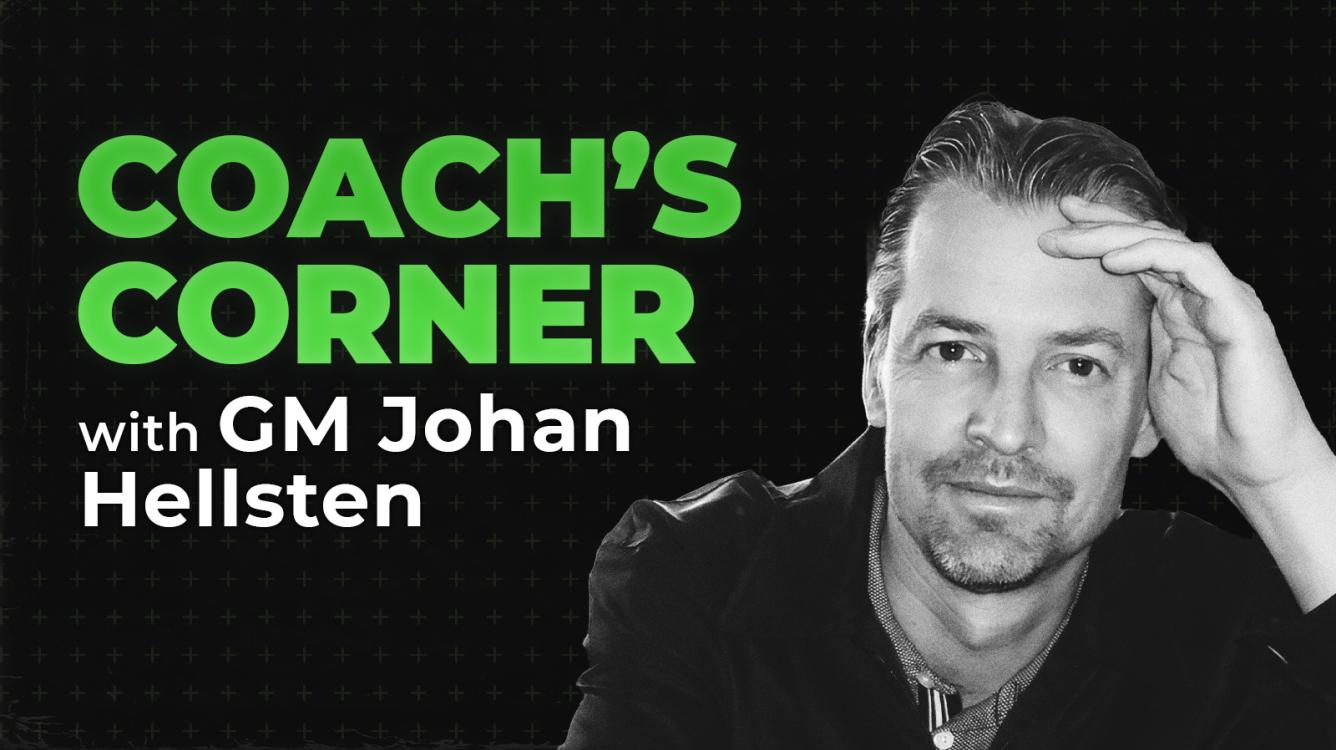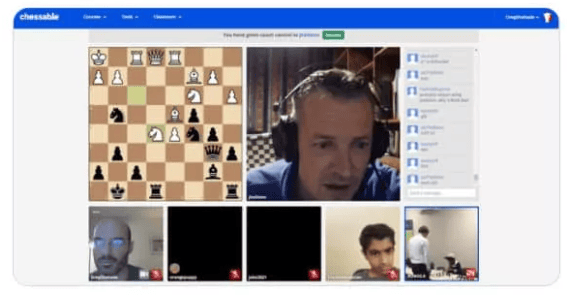
Coach's Corner: Johan Hellsten
Coach’s Corner is your inside look into what top coaches and authors think is best way to improve your chess.
In this edition, we're interviewing none other than Grandmaster Johan Hellsten. Hellsten quite literally wrote the book on strategy with his enormously popular Mastering Chess Strategy series.
He's one of the top players of his home country of Sweden, where he became National Champion in 2006, and an extremely popular Chessable author. Today, he offers his chess improvement tips:
What's your coaching philosophy?
Be as flexible as possible. Adjust contents and methods to the strength, profile, and age of the students. Every student is unique, each chess player has a unique story. Be ready to improvise during lessons, for instance bringing up further examples related to something that we just saw on the board.
The other day, when checking the Kaidanov - Vaishali rook endgame with a student, we then had a look at the much older example Morovic - Gulko which touched upon a similar situation. At a group lesson earlier this week, we came across a combination based on a white queen arriving at h7 after a rook sacrifice on f7. I remembered a few related examples, such as a nice attacking game by Mamedyarov some 20 years ago, and quickly added these to the session.
I'm not a psychologist, but I do think it makes sense to see multiple examples featuring a similar idea or pattern for them to establish themselves firmly in our minds. Technology is really useful here - we can quickly perform specific searches in our databases and retrieve the relevant examples. I label all my examples according to the key idea(s) involved, just as Dvoretsky recommended in his works. Labels such as "bishop pair", "active king", "prophylaxis", etc. make it easy to organize our material, and multiple labels for one single example are of course possible.
Suppose a player has only 3 hours a week for chess training. How should they spend their time?
That depends on the profile of the player. To be successful in chess, one needs to be universal, i.e. efficient in all aspects of the game - tactics, endgames, strategy, and openings - no matter one's personal style. So I'd suggest spending the main part of those 3 hours in the area(s) where one is least proficient but always trying to work all the areas throughout the week, for the sake of variety.
What is the biggest factor for improvement for players under 1200 (Chess.com)? Under 2000?
U1200: I suppose tactics, since it's the base of everything else. For instance, intermediate checks often come up in rook endgames.
U2000: Analysis of one's own games, which will indirectly lead to work in the most necessary areas. Understanding how the pawn structure itself might whisper a specific plan to us, how to punish our opponent for neglecting opening principles, and so on.

What is your preferred way to improve at tactics and strategy?
In my opinion, interactive learning is fundamental. Nowadays, there are so many tools available, tactics training platforms etc. which can help in improving one's calculation. By the way, I find it interesting that the exercises on such sites seem to be rated by the results of the solvers - the more failures, the higher the rating of the involved exercise. It's clear that the platforms themselves, or any computer program, can't judge the human difficulty involved; that can only be done by humans!
This is, in my opinion, a major issue with the influence of chess engines - the practical value of this or that choice, i.e. the ease or difficulty involved both for ourselves and for the opponent, is not considered. The more relaxed our relationship with computer evaluations, the better, I think. Note that the world's best players throughout the last century grew up without chess engines, and they became very strong anyway, right? Who wouldn't have enjoyed reaching the heights of, let's say, Shirov or Adams?
As for improving within strategy, I don't think it's much different from other areas, just make sure to do a lot of exercises, getting used to different ideas and patterns.
What is your preferred way to improve at openings? What's the approach to chess openings that you try to teach your students?
A first step is to make sure that your repertoire is coherent with your style and preferences. If you don't enjoy sharp attacking play, then don't play the Sicilian Dragon (unless for "therapy" purposes!) and so on. However, make sure to have a look at multiple openings - the great number of types of positions that we can handle, the better for our general skills. You might be astonished to see how many different openings Magnus Carlsen played as a kid! Again, there are so many tools available, and contrary to when I was growing up, opening works today clearly consider the student's role.
For instance, the opening courses on Chessable allow you to easily practice your opening lines move by move. Back in my day, magic memorization skills were needed to remember at the board what you had looked up on an earlier day in the Chess Informant ![]() .
.
A few further pieces of advice:
a) you could pick a specific player and make a little file based on the way he or she plays a specific opening - for instance, Georg Meier in the French
b) online sites such as Chess.com allow us to instantly practice any new opening lines, and those games could definitely be inserted into your opening files after reviewing them
c) look for flexibility in your repertoire to make your opponent's preparation a bit more difficult, by adding second choices along the way, etc.
What is your preferred way to improve at the endgame?
I'm sounding like an old disc, but again, practice is fundamental. Also in this area, there are many interactive resources available. I remember some of the endgame training applications that appeared in the new millennium, allowing you to study and then practice all kinds of endgames on the screen. How I would have loved to see such software back in the 80s instead of reading the traditional endgame works, page after page...
One piece of advice is to play out specific endgames, or scenarios, against other players, or in the worst case, a chess engine. The online sites allow you to start training games from a specific position, which is great for endgame practice, and I have even carried out thematic simuls using this mechanism, for instance in Chessable Classroom.
Johan's Courses
If you like Johan's approach to chess learning, then you'll be pleased to hear he has a significant number of Chessable courses!
You can try out each part of his Mastering Chess Strategy series for free here:
Johan Hellsten: Free Strategy Lesson
Johan Hellsten: Free Endgame Lesson